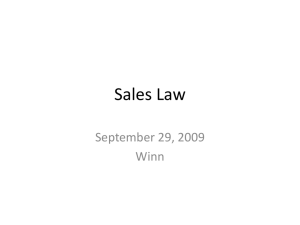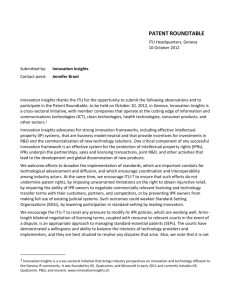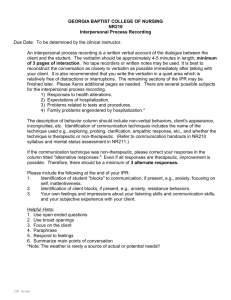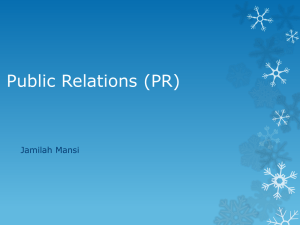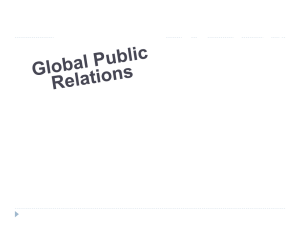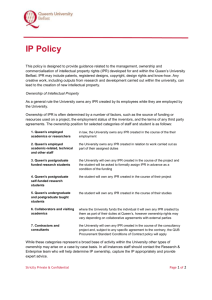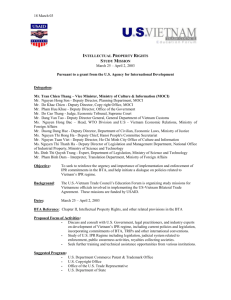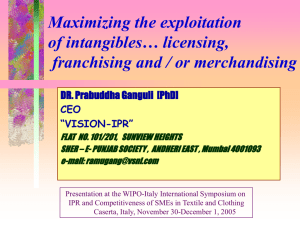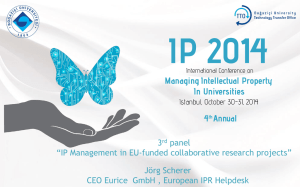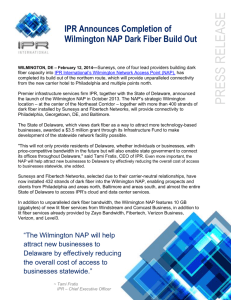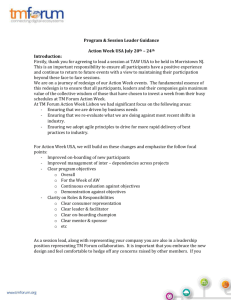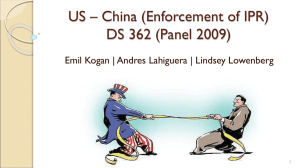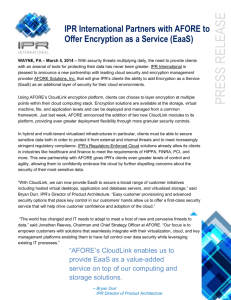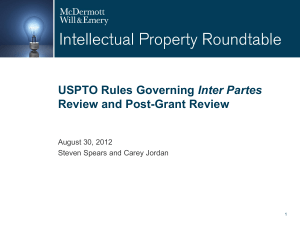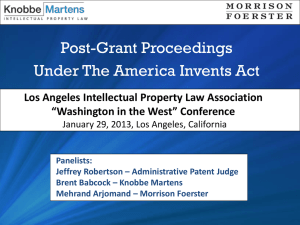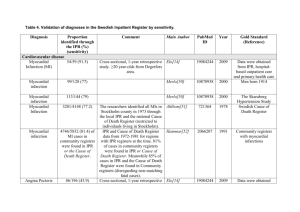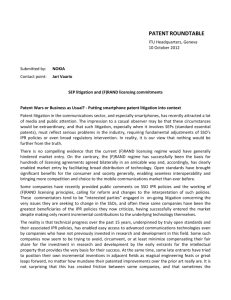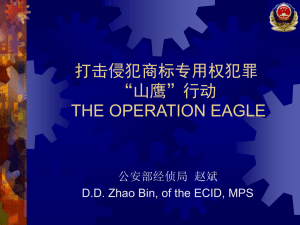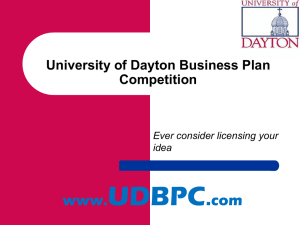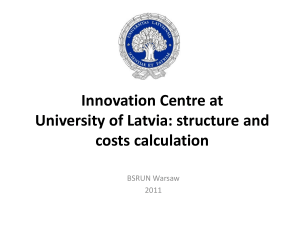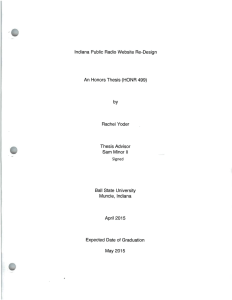Topic 3
advertisement
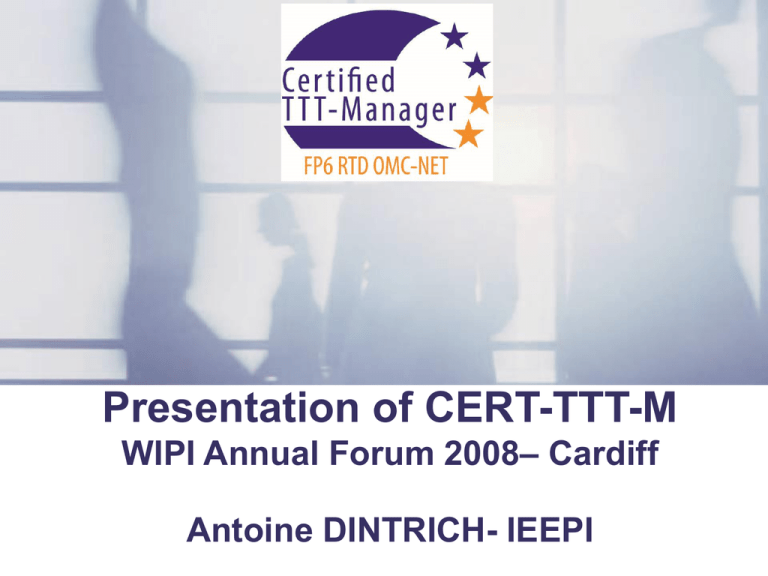
Presentation of CERT-TTT-M WIPI Annual Forum 2008– Cardiff Antoine DINTRICH- IEEPI The “European Institute for Enterprise and Intellectual Property” Created in 2004 by the French Ministry of Industry and INPI (French NPO) in order to provide training sessions on the economic and strategic issues of intellectual property (IP). Promote "intellectual property awareness" within companies, focusing on SME / SMI. Develops and organizes training sessions on the offensive aspects of IP and innovation Is implicated in different European projects aiming at the development of IP awareness toward SMEs. CERT-TTT-M… • means Certified Transnational Technology Transfer Manager • project within the FP6 programme of the EU • Based on key assumptions of European IPR experts : Lack of TT skilled people No registered TT profession No TT education / training programme recognised all over Europe 2 CERT-TTT-M… …addresses to the findings of CREST IPR expert group • Lack of holistic/integrated TT education programs • Lack of trans-national/international attitude of education • No sufficient assessment of TT-skills possible (comparable) • No clear TT career structure / no accreditation for TT professionals • No sufficient benchmarks on education TT programmes in EU-27 (comparable) 3 CERT-TTM… To build up a blue-print education programme that possibly : • Professionalizes TT on a trans-national level • Covers all phases of the TT process • Meets the need for an official recognized course • Supports MS policy-makers • Standardizes the skill-set of TT profession in Europe • Is based on surveys on demand and supply 4 CERT-TTT-M at a glance • 11 partners of 7 Member States, 5 PROs, 7 policy makers (also CREST participants) • Advisory Panel: IPR/TT relevant organisations • Budget: € 1,3 Mio. • 6 workpackages • Duration: 24 months (2007-2008) 5 CERT-TTT-M Partner 11 Participants from 7 Countries Austria: AWS – MCI Belgium / Flanders: IWT France: IEEPI – MESR Italy: ASTER – ERPDA Latvia: LIDA Netherlands: EZ – RSM Sweden: VINNOVA 6 Advisory panel 7 Members • • • • • • • European Patent Academy LES France LESI ProTon Europe Societas Rudolphina The Institute of Knowledge Transfer ASTP & PRAXIS 7 CERT-TTT-M: Big Picture Advisory Panel (European Patent Academy, LES, ProTon, Societas Rudolphina, ASTP …) WP1 Inventarisation of Requirements WP2 WP3 Survey of existing programmes Steering Commitee WP4 WP5 Building up Providing for Dissemination educational & Mutual & Transfer organisational Recognition Training frame Award WP6 Project Coordination Financial Management The Policy Makers 8 1) Online Survey (1) • Sample: • 561 European technology transfer professionals • Key skills ranked: • Communication • Commercial Awareness (negotiation,KL of IPR, KL of Licensing, networking) • New Business Development • Industry Specific Expertise 9 1) Online Survey (2) • Key training‘ interests ranked: • Most Interest: • New Business Development • Knowledge on IPR & Licensing • Negotiation • Second most interest: • Commercial awareness • Communication • Networking • Least interest: • Industry specific expertise 10 1) Online Survey (3) • Interest: • Between 37% and 52% of respondents would be interested to receive training on at least one skill • 83% indicated that their organization would be interested to receive training on at least one skill • Market Size and Fee: • 22.700 Technology Transfer Professionals in Europe • 18.880 are interested in participating in such a training • Average tuition fee: 1800 Euros • Certification: • 73% indicated that it is important to receive a European-wide recognized certification 11 2) Study on European TT Education Programmes & Benchmarking (1) • Sample: 161 courses in 19 EU countries • Skill rating by the existing TT education programmes: 1) 2) 3) 4) 5) 6) 7) New Business Development Commercial Awareness Knowledge of IPR and Licensing Networking Industry Specific Expertise Communication Negotiation 12 2) Study on European TT Education Programmes & Benchmarking (2) • Duration Very large scope (3 days to 3 semesters) • Fee Between 770€ (Workshop) and 8900€ (Master executive programme) • Certification Only Master programme • Participant number Average 25 persons 13 3) Building up educational and organisational framework (1) • Elaboration of the first scenarios of the training program • • • • Identification of the different target groups the training program can to be addressed Analyse of each possible scenario Definition of the ultimate target group Specification of the educational framework As primary target group : people with working experience in or outside the field 14 3) Building up educational and organisational framework (2) • Structure for the curriculum contains 3 consecutive levels: 3. Executive level Executive Technology Transfer Professional (ETTP) Module 1 Module 2 … 2. Advanced, intermediate level Senior Technology Transfer Professional (STTP) Module 1 Module 2 … 1. Basic requirements Technology Transfer Professional (TTP) Module 1 Module 2 … Each level will be composed of different modules and each level will be completed after having passed required exams. 15 3) Building up educational and organisational framework (3) • The six different skills that were defined are: 1. 2. 3. 4. 5. 6. Managing Communication, Information an networking Understanding IPR & Licensing Commercial Activities and Markets New Business Development Negotiating Project management 14 3) Building up educational and organisational framework (4) • Expected duration of the curriculum: Skills \ Levels 1. Basic 2. Advanced 3. Executive Total 3 – 4 days 3 – 4 days 1 – 2 days 7 – 10 days Understanding IPR & Licensing 2 days 2 days 1 – 2 days 5 – 6 days Commercial Activities and Markets 2 days 2 days 1 – 2 days 5 – 6 days New Business Development 2 days 2 days 1 – 2 days 5 – 6 days Negotiating 2 days 2 days 1 – 2 days 5 – 6 days Project management 2 days 2 days 1 – 2 days 5 – 6 days 13 – 14 days 13 – 14 days 6 – 12 days 32 – 40 days Managing Communication, Information an networking Total 14 Next steps : • Identification of European training institutions interested in implementing the course (September 2008) • Commitment of at least 5 institutions in 5 different countries to implement the training course (October – December 2008) • Providing for Mutual Recognition aiming at an accreditation on a Europe-wide basis (October 2008 – January 2009) 16 Contacts Project co-ordination: Gasteiger Georg G.Gasteiger@awsg.at European Commission Project Officer: Jan Larosse Jean.LAROSSE@ec-europa.eu www.ttt-manager.eu 17 Thank you for your attention… Antoine DINTRICH WWW.ieepi.org 18
